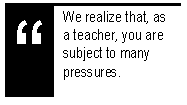
|
This guide explains how you can minimize the hazardous wastes and other chemical pollution generated by experiments that are performed in classroom laboratories. It is intended for middle school, high school, and college science teachers.
Specifically, this guide will help you
The guidance presented is just that—guidance. Weigh it against other factors and always follow your good judgment; prudent safety practices; federal, state, and local laws and regulations; and school policies. Because this guide is intended for teachers ranging from middle school to college, some of the guidelines we present may not apply to you. For example, guidance to substitute cyclohexane for benzene would be irrelevant to a middle school science teacher, whose students would never use a substance as hazardous as benzene. Similarly, a high school teacher might not have access to the resources needed to obtain the equipment necessary to do microscale experiments. If a guideline doesn’t apply to you, it may give you other ideas. If you feel a guideline may be very helpful but you do not have the resources to implement it, you may want to approach your administration and request the necessary resources. |
 |
We realize that, as a teacher, you are subject to many pressures. We don’t want waste minimization and pollution prevention to become another burden. It is our intention that this guide will provide you with information to help you deal with important waste minimization issues in the easiest manner possible. In fact, you should find that minimizing waste will simplify other jobs that you currently perform, such as disposing of chemicals and dealing with excess inventory. |
Copyright © 1996 Battelle Seattle Research Center. All rights reserved.